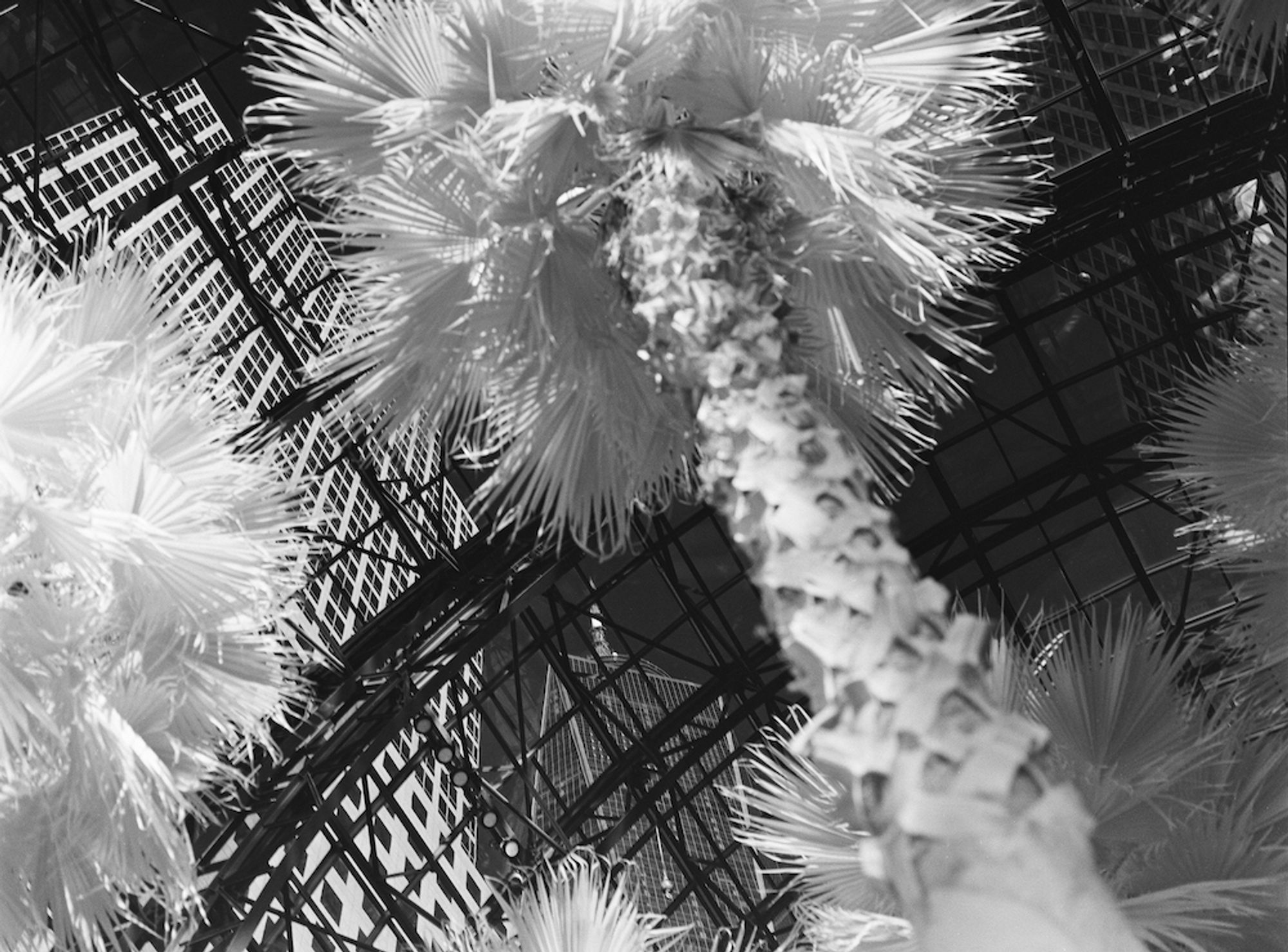Return Sale
February 19–April 3, 2022
In Return Sale, artists Christian Hincapié, Emily Jacir, and Rose Salane document the entwined relationship between consumerism and securitization within retail spaces in Lower Manhattan. Through an examination of defunct, destroyed, and rebuilt malls and department stores, the exhibition traces the “mall-ification” of Lower Manhattan parallel to cycles of crisis in the city.

Return Sale is organized by Camila Palomino, Abrons 2021-2022 Curatorial Resident.
Return Sale brings together works by three artists who investigate malls and department stores in Lower Manhattan and the entwined relationship between retail and urban space. Like much of New York City, Lower Manhattan has been repeatedly shaped by waves of urban development and redevelopment in the hands of private interest stakeholders. Corporations and developers accelerated the expansion of the Financial District in the 1960’s with iconic buildings and visions of limitless global trade. After the September 11th attacks of 2001, the influx of specialty retailers signaled the city’s resilience and cultivated an air of “glamour”—while also driving up real estate values and making the area easier to surveil. Each artist in Return Sale focuses on different retail complexes in Lower Manhattan through image-based and documentarian methods.
Emily Jacir’s installation, made from photographs of objects she purchased and returned at the Mall at the World Trade Center, performs and critiques fantasies of infinite mobility.
Rose Salane uses remnants from luxury-for-less department stores such as Century 21 and Syms to reflect on how memory and consumer behavior is shaped within these monolithic containers of excess.
In a newly commissioned project, Christian Hincapié surveys the uncanny fragility of the The Winter Garden Atrium at the World Financial Center and reminds us of the invisibilized maintenance work required to preserve other monuments to capitalism such as Zuccotti Park and the Oculus. Across three galleries, Return Sale maps the overlapping architectural, social, and economic systems within retail that are embedded in the continual transformation of urban space in New York City.
ABOUT
Camila Palomino is an independent curator and researcher from New York City. Her research is invested in the aesthetic relationships between imaging and security technologies, urban infrastructures, and social memory. Camila is currently curatorial assistant at the Vera List Center, the 2021-2022 Curator in Residence at Abrons Arts Center, and the 2022 In Practice Curatorial Fellow at SculptureCenter. She has previously held curatorial positions and contributed research to exhibitions at the Whitney Museum of American Art, MoMA PS1, The Drawing Center, and the 58th Carnegie International. She is a curatorial consultant at Amie Gross Architects on a project that commissions artworks by Queens-based artists for new affordable housing buildings in the borough. Camila has also been a visiting lecturer in The Photography Program at Bard College. She holds a BA from the University of Chicago and an MA in Curatorial Studies from the Center for Curatorial Studies, Bard College. As poetic as it is political and biographical, Emily Jacir’s work investigates translation, transformation, resistance, and movement. Jacir has built a complex and compelling oeuvre through a diverse range of media and methodologies that include unearthing historical material, performative gestures and in-depth research. Her works have been widely exhibited all over the world since 1994, and she has been honored for her achievements with several awards including a Golden Lion at the 52nd Venice Biennale (2007); a Prince Claus Award (2007); the Hugo Boss Prize at the Guggenheim Museum (2008); the Alpert Award (2011) from the Herb Alpert Foundation; and the Andrew W. Mellon Foundation Rome Prize Fellow at the American Academy in Rome (2015) among others. She is the founder and Executive Director of Dar Yusuf Nasri Jacir for Art and Research in Bethlehem, Palestine.
Christian Hincapié is a Colombian-American artist born in 1989. Hincapié's work relates to the specific circumstances and histories of places he comes in contact with. Through active observation and research, Hincapié brings together the material traces that reflect the simultaneous presence of both distinct individuals and the effects of power over the world. His work is multidisciplinary, incorporating projects in drawing, photography, painting, sculpture, printmaking, and the artist book form. He attended the Yale Norfolk program in 2012 and received his BFA from the Cooper Union in 2013. His work has been shown through the Public Art Fund, High Tide Gallery in Philadelphia, La Mama Gallery, Mana Contemporary, NARS Foundation, and various artist-run spaces in the Tri-state area. Hincapié received his MFA in 2020 from Rutgers University where he is a Part-Time Lecturer. In 2021, he was a Keyholder Resident at the LES Printshop and a recipient of a BRIO Grant from the Bronx Council on the Arts.
Rose Salane (b. 1992, lives and works in New York City) is an artist who works with text, found objects and personal archives to reexamine significant social and cultural moments. Working across disciplines such as urban planning and sociology, her work addresses the truths rooted within testimonies of those who were witnesses to the conditions and time period being examined, often revealing narratives that are otherwise inaccessible through a macro historical lens. Salane has previously exhibited at The New Museum, New York, New York, USA (2021); The Hessel Museum of Art, Annandale-on-Hudson, New York, USA (2021); MIT List Visual Arts Center, Cambridge, Massachusetts, USA (2019); Guangdong Times Museum, Guangzhou, China (2019); Carlos/Ishikawa, London, UK (2018). She holds a BFA from The Cooper Union for the Advancement of Science and Art and a Master of Urban Planning from the Bernard & Anne Spitzer School of Architecture at The City College of New York.
FUNDING
Return Sale is commissioned by Abrons Arts Center with support from the Andy Warhol Foundation for the Visual Arts, the Jacques and Natasha Gelman Foundation, and the Center for Human Rights and the Arts, Open Society University Network Image courtesy of Christian Hincapié